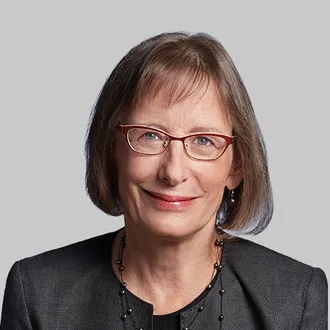In Memory of Jim Block, MD
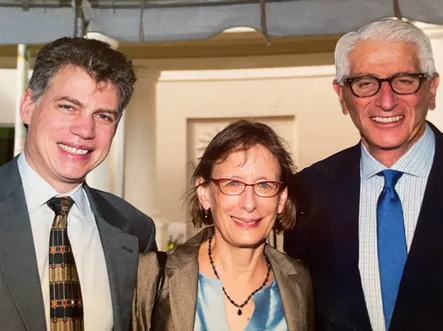
James Alan Block, MD, died October 9, 2023, almost a year after a diagnosis of Lewy Body dementia. Jim was a steady and powerful advocate for palliative care, reminding all of us of the profound importance of the field and its potential to restore compassion into the practice of medicine. I am grateful for his guidance, unflagging moral and strategic support, and his friendship over many years. I first met him at an AAHPM Annual Assembly twenty-some years ago—he came up to me and introduced himself, saying he was now working as a consultant and was interested in this new field of palliative care. I learned that he had previously served as CEO of several large academic medical centers and that he understood organized medicine and where the leverage was. As a product of the isolated ivory tower, I had much to learn about the mechanics of our health care system.
Accreditation
I did not understand how important, for example, accreditation is in determining the behavior of hospitals and other health providers such as hospices, home care agencies, and nursing homes. No accreditation, no reimbursement. He brought me to Chicago to meet the then-president of The Joint Commission, Dennis O’Leary, who also died this year. O’Leary made it clear that reaching a critical mass of palliative care programs in major hospitals was a prerequisite to establishing an accreditation requirement. As a result of this guidance, CAPC focused intensively on scaling hospital palliative care to the nation’s major teaching and largest hospitals, eventually reaching penetration to 83% of hospitals with over 50 beds, and 100% of major teaching hospitals in the United States.
Standardization
Both Jim and Dennis conveyed the importance of establishing quality standards for clinical palliative care, a step essential to standardization and accountability for access and quality—and therefore for accreditation. In collaboration with colleagues in nursing, social work, and chaplaincy, we obtained funding to begin the National Consensus Project for Quality Palliative Care. The Clinical Practice Guidelines for Quality Palliative Care (NCP Guidelines), now in its fourth edition, establishes a foundation for gold-standard palliative care for all people living with serious illness, regardless of their diagnosis, prognosis, age, or setting. The NCP Guidelines were developed by 17 national organizations that provided representatives to serve on the steering committee and writing workgroup. More than 90 national organizations have endorsed/supported the fourth edition, building recognition and support for the standardization of quality palliative care across multiple elements of the health care system.
Research
Jim was also key to securing philanthropic funding for the National Palliative Care Research Center (NPCRC), a sister organization to CAPC focused specifically on building research capacity in the field. The mission of the NPCRC is to strengthen the evidence-based foundation needed for health policy and clinical practice in palliative care by growing and supporting the community of palliative care research scientists and stimulating expanded research and innovation. Jim understood that the future of the field is critically dependent on its legitimacy as an academic specialty with implications for training, reputation, and, ultimately, quality of care for patients.
"Jim understood that the future of the field is critically dependent on its legitimacy as an academic specialty with implications for training, reputation, and, ultimately, quality of care for patients."
The NPCRC has provided a mechanism to a) Establish priorities for palliative care research; b) Develop a new generation of researchers in palliative care; and c) Coordinate and support studies focused on improving care for patients and families living with serious illness. In partnership with the Center to Advance Palliative Care (CAPC), the NPCRC will translate these findings into clinical practice. Jim did not live long enough to learn that the work of the NPCRC will now be continued by the National Institutes of Health (NIH), a huge step forward for the future of our field, and one for which he advocated for years.
Personal Outreach and Relationships
Jim taught us to move away from email and pick up the phone. His skill at establishing and building relationships with people at key organizations was a lesson in social change strategy; like everything else in life, it’s all based on relationships. For example, he picked up the phone in 2006 and cold-called the CEO of the American Cancer Society (ACS), set up a face-to-face meeting, and helped persuade ACS to support pilot and exploratory grants in cancer palliative care through their already established grants programs. For a generation used to communicating by text and email, learning to pick up the phone and talk to people has once again become a new and essential skill.
"His skill at establishing and building relationships with people at key organizations was a lesson in social change strategy; like everything else in life, it’s all based on relationships.
Jim was also a dear friend to me and my husband Sean, and all of our kids. We shared adventures, listened to jazz, and ate a lot of good food together. I am having trouble believing he is gone. He is dearly missed.
I asked some of Jim’s friends and colleagues from our work together to offer their remembrances...
“Jim, as he liked to say, ran hospitals. And if you pressed him, he might tell you those hospitals were Johns Hopkins University and the University Hospitals Health System of Case Western Reserve. For the last 20 years of his life, Jim worked as a strategic advisor to both CAPC and the National Palliative Care Research Center to advance the clinical practice and science of the new field of palliative care. Using his decades of leadership and experience in the U.S. health system, he worked tirelessly to guide palliative care leaders as they sought to legitimize, standardize access to, and enhance the evidence base of palliative care for all seriously ill persons and their families. His influence helped establish palliative medicine as an official medical specialty; create hospital palliative care programs across the country; and develop the infrastructure and resources necessary to nurture scientific research in service of improving the quality of palliative care. Dr. Block's legacy extends beyond his remarkable contributions to CAPC and NPCRC; it lives on in the countless lives he touched, over the course of his remarkable career in health care. His commitment to enhancing the care of people living with serious illness serves as an enduring inspiration for current and future generations of clinicians and scientists alike.”
- R. Sean Morrison, MD
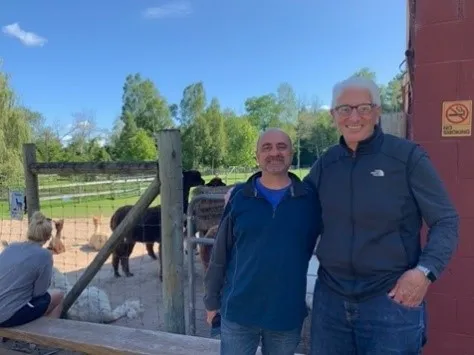
“Early on when Jim and I first met, we joked about being “twin” brothers, even though we had close to 30 years separating us. Jim truly ended up being like a brother to me. Positive, funny, encouraging. Any time spent with Jim left me feeling positive about the possibilities, myself, and the world.”
- Tom Gualtieri-Reed, MBA
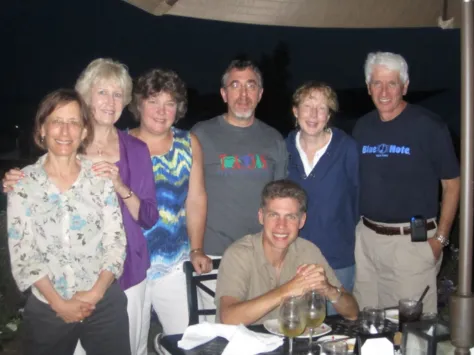
“Working with and watching Jim work I reflected that he was the “least Type A” CEO I have ever met; he could channel executive mojo in a low-key, inclusive manner. Jim kept thinking above the fray—not getting lost in busyness and detail—and could, through a few observations or questions, “step the conversation up” to what was important. And by doing that he helped others find common ground and move mountains rather than molehills. Jim understood that money was a tool, not an end product or goal. And, he could be magical in introducing people with ideas and grit to drive change to people with money as a tool. Jim understood the realities of budgets and constraints but was not limited by them. He could “pull forward” toward bigger solutions. He tuned out the “noise” and focused on actions that could change the game. He always looked at the horizon, not the ground. Jim was genuinely curious about others and could engage leaders 1 on 1 to learn what they valued, and then craft a simple proposal or solution that moved the needle on big issues. Jim worked with and through others, mentored generously, and multiplied his impact."
- Lynn Spragens, MBA
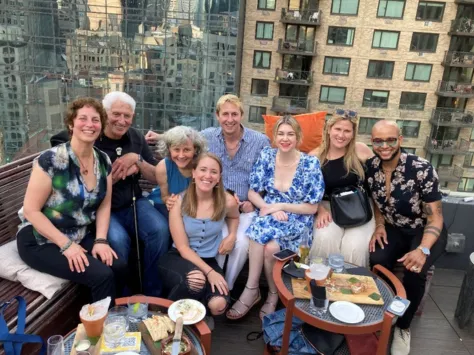
“Despite his incredible experience and seniority, Jim was the nicest, most generous person I’ve met in my career journey. He was always available when I needed him and made me feel valued, heard, and cared for. His passion and energy to improve the care of patients was infectious and I learned so much from him in a short time. I miss him.”
- Maddy Jacobs, MPA
"I think his secret was that he truly cared about and tried to understand everyone—from patients, to clinicians, to the person sitting across the negotiation table."
“Jim had a vision of a fundamentally different and better future for patients and families, and he was an especially powerful advocate for those whose voices aren’t normally heard. Because of his humility, you might have met Jim and never knew that he moved mountains in health care. I think his secret was that he truly cared about and tried to understand everyone—from patients, to clinicians, to the person sitting across the negotiation table. Because of that, he could forge relationships and find pathways that made change possible. I’m going to miss Jim’s wise advice, his wonderful laugh, and his big ideas—I feel lucky to have had him as a friend.”
- Brynn Bowman, MPA
“I was so sad to hear that Jim died. He was such a strong, consistent, and thoughtful supporter of palliative care and of CAPC for so long. What a huge loss. Hope his end of life was peaceful, comfortable, and dignified, in the way he advocated for everyone else.”
- Steve Pantilat, MD
“I met Jim 20 years ago and felt almost instantly that I’d known him for a long time because he was so easy to talk to and so interesting to hear what he was thinking. He helped the Kornfeld Foundation understand, value, and then fund research in palliative care through the creation of NPCRC. He was so strategic and bold in his ideas but also so realistic and practical. I will miss his unique laugh, his incisive advice, his marvelous friendship, and his friendly teasing. I will miss not having Jim to turn to.”
- Bobye List
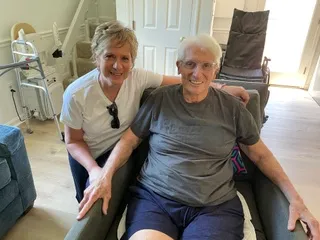
“Jim and I didn’t know each other well when we connected at the 2016 NAACOS conference in Baltimore. He asked if he could take my husband and me out to dinner and I was awed by the invitation! He spoke glowingly about his mentor and all he had gained from that relationship as a young professional, and then on an impulse, I asked if he would be my mentor! In a very “Jim” way, he paused (and I thought he would say something about being too busy, etc.) and he said, “I would be honored.” I had no idea how pivotal that moment would be in my development as a leader, but looking back, it was the thing that mattered the most.
Jim was my mentor, champion, expert, and friend who showed up in the worst of times with insight and energy that kept me going. We remained close until he died, going to jazz concerts in Baltimore with my husband, or meeting our family for lunch to celebrate, becoming part of our family. We really miss him. And I am forever grateful to have had him in my life. Rest in peace, my friend.”
- Donna Stevens, MHA
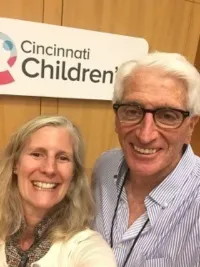
“One of my fondest and most memorable excursions with Jim was a road trip we took from a work meeting in Cincinnati to Dayton so he could show me around the town where he grew up. As we savored an amazing steak dinner at The Pine Club, it struck me how his humble Ohio roots really grounded him in his greatness—as a mentor, a father, a health executive, a strategic genius, and the dearest kind of friend you could ever hope to have. His legacy of human connection, caring, and humility galvanized professional passion for so many of us we can’t possibly keep count. May we all be inspired in his memory to move the mountains and successfully bring palliative care everywhere!”
- Rebecca Kirch, JD
If you are interested in reading Jim’s obituary, there are two to choose from: The Baltimore Sun and the funeral home.
